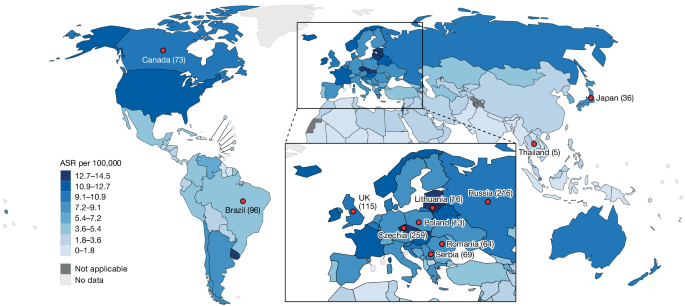Uncovering Geographic Variations in Mutagenic Exposures Linked to Kidney Cancer Genomes Across 11 Countries
Główne pojęcia
Distinct mutational profiles in kidney cancer genomes across 11 countries suggest the existence of multiple, geographically variable mutagenic exposures that contribute substantially to cancer burden.
Streszczenie
This study analyzed the genomic profiles of 962 clear cell renal cell carcinoma samples from 11 countries with varying incidence rates of kidney cancer. The key findings are:
-
Somatic mutation profiles differed significantly between countries, indicating the presence of geographically variable mutagenic exposures.
-
In Romania, Serbia, and Thailand, a mutational signature characteristic of aristolochic acid compounds was present in most cases, but rare elsewhere.
-
In Japan, a mutational signature of unknown cause was found in over 70% of cases, but less than 2% elsewhere.
-
Another mutational signature of unknown cause was ubiquitous but exhibited higher mutation loads in countries with higher kidney cancer incidence rates.
-
Known signatures of tobacco smoking correlated with tobacco consumption, but no signature was associated with obesity or hypertension, suggesting non-mutagenic mechanisms for these risk factors.
The results highlight the existence of multiple, geographically variable, mutagenic exposures that potentially affect tens of millions of people globally and provide new opportunities for understanding the underlying causes of kidney cancer.
Przetłumacz źródło
Na inny język
Generuj mapę myśli
z treści źródłowej
Odwiedź źródło
www.nature.com
Geographic variation of mutagenic exposures in kidney cancer genomes - Nature
Statystyki
The study sequenced 962 clear cell renal cell carcinoma samples from 11 countries.
Mutational signatures characteristic of aristolochic acid compounds were present in most cases in Romania, Serbia, and Thailand, but rare elsewhere.
A mutational signature of unknown cause was found in over 70% of cases in Japan, but less than 2% elsewhere.
Cytaty
"International differences in the incidence of many cancer types indicate the existence of carcinogen exposures that have not yet been identified by conventional epidemiology make a substantial contribution to cancer burden."
"The results of this study indicate the existence of multiple, geographically variable, mutagenic exposures that potentially affect tens of millions of people and illustrate the opportunities for new insights into cancer causation through large-scale global cancer genomics."
Głębsze pytania
What are the specific environmental or lifestyle factors that may be responsible for the geographically variable mutational signatures observed in this study?
The geographically variable mutational signatures observed in this study can be attributed to specific environmental or lifestyle factors. For instance, in Romania, Serbia, and Thailand, the presence of mutational signatures characteristic of aristolochic acid compounds in clear cell renal cell carcinomas suggests exposure to this carcinogen in these regions. On the other hand, in Japan, the high prevalence of a mutational signature of unknown cause in kidney cancer cases indicates a unique environmental or lifestyle factor influencing mutagenesis. Additionally, the higher mutation loads of a ubiquitous mutational signature in countries with higher kidney cancer incidence rates point towards a common environmental exposure contributing to mutagenesis in these regions.
How can the unknown mutational signatures identified in this study be further investigated to uncover their underlying causes?
To uncover the underlying causes of the unknown mutational signatures identified in this study, further investigations can be conducted using various approaches. One strategy could involve conducting experimental studies to simulate the conditions leading to these mutational signatures in cell or animal models. By exposing these models to suspected environmental agents or lifestyle factors prevalent in regions with high incidence rates of kidney cancer, researchers can observe if similar mutational patterns emerge. Additionally, conducting epidemiological studies to correlate the presence of these unknown mutational signatures with specific environmental exposures or genetic predispositions can provide valuable insights into their origins. Collaborative efforts between researchers across different regions can also help in pooling data and resources to unravel the underlying causes of these unknown mutational signatures.
What implications do these findings have for global cancer prevention and public health strategies targeting kidney cancer and other cancer types with geographic variations in incidence?
The findings of this study have significant implications for global cancer prevention and public health strategies, especially for kidney cancer and other cancer types with geographic variations in incidence. By identifying multiple geographically variable mutagenic exposures contributing to kidney cancer, there is a need for targeted prevention efforts in regions where specific carcinogens are prevalent. Public health strategies can be tailored to educate populations in high-risk areas about the dangers of these environmental exposures and promote lifestyle modifications to reduce cancer risk. Furthermore, the discovery of unknown mutational signatures highlights the importance of continued research to uncover novel carcinogens and develop preventive measures. Implementing comprehensive cancer screening programs in regions with high incidence rates and integrating genomic data into public health policies can aid in early detection and personalized treatment strategies, ultimately reducing the global burden of kidney cancer and other cancers with geographic disparities in incidence.

